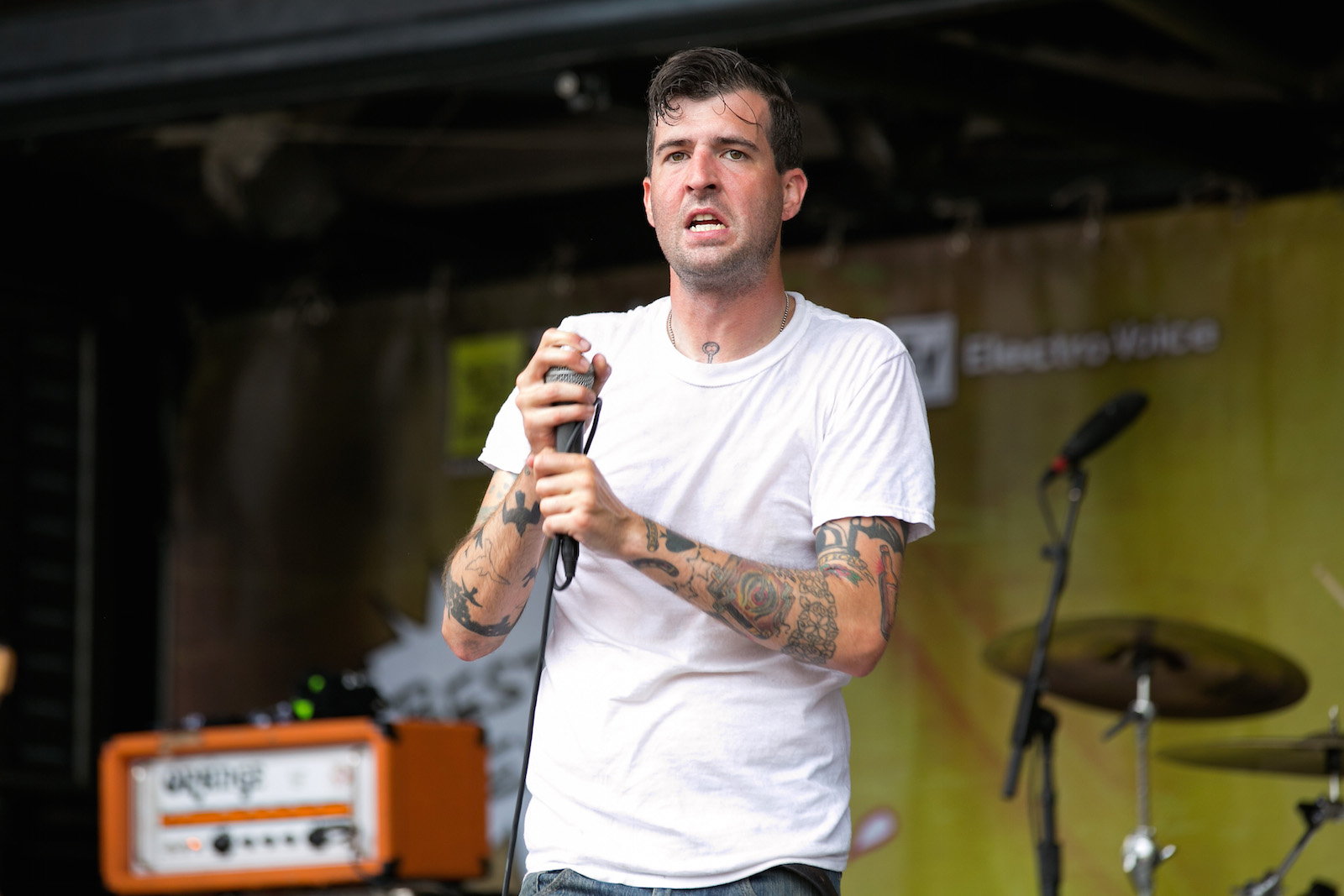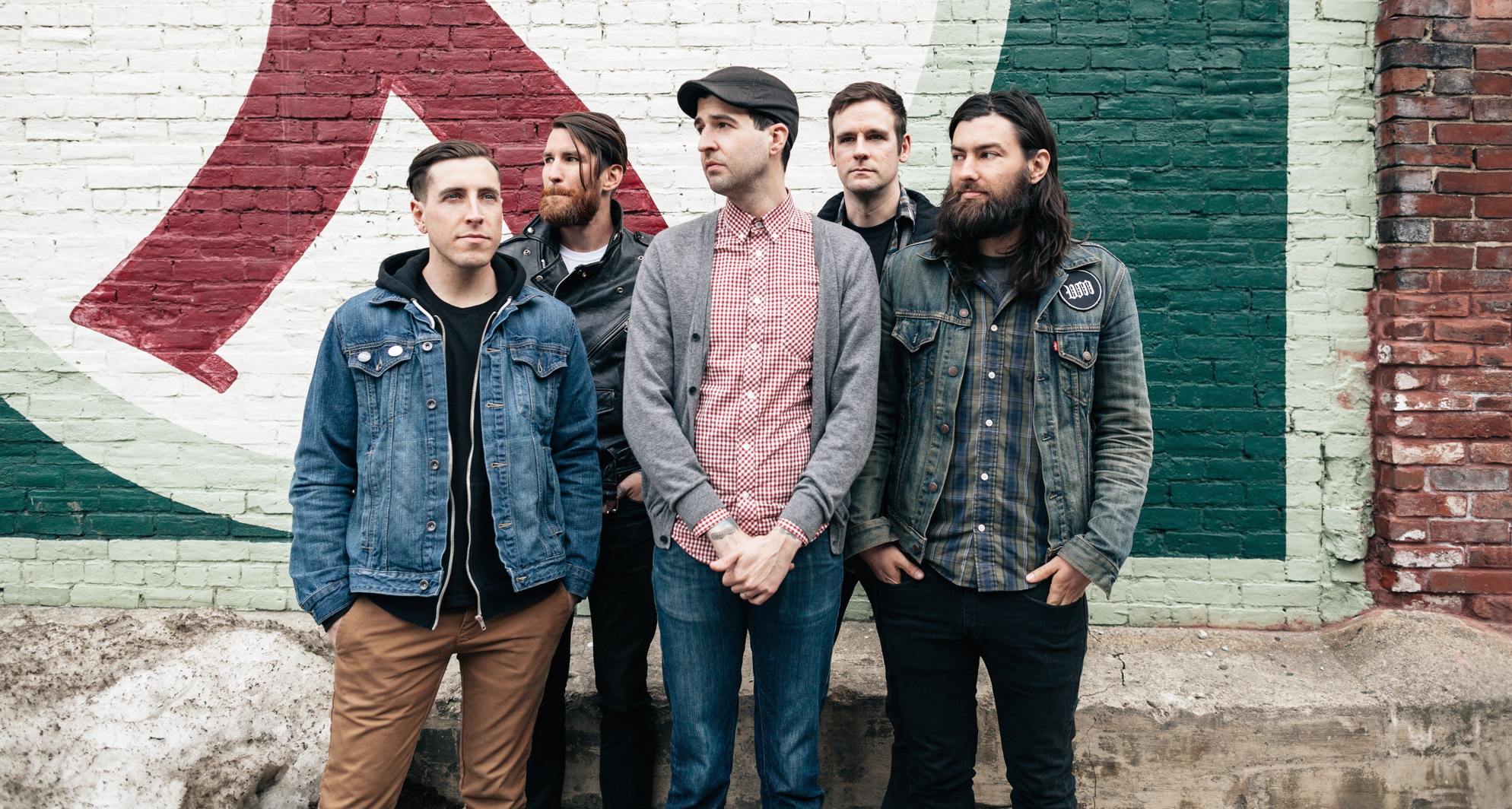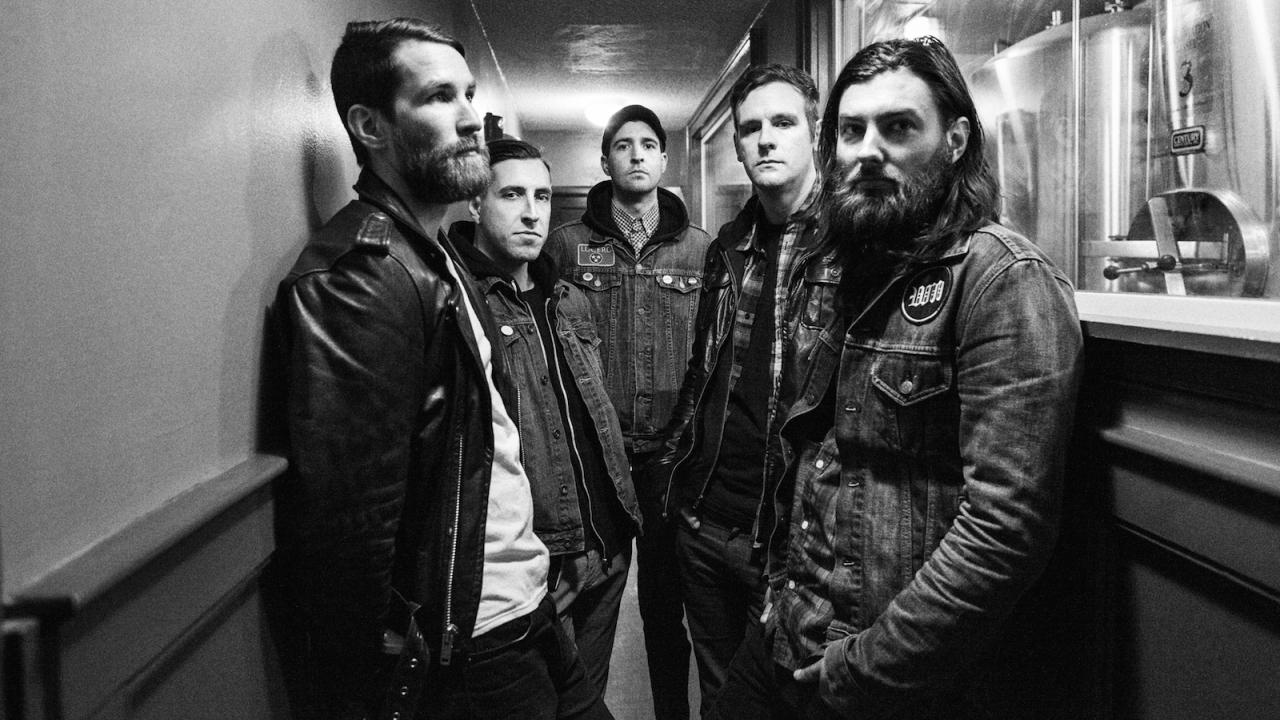Since 2008, when Defeater released debut album ‘Travels’, the Boston five-piece have been straddling time and space between the here and now of their visceral, intelligent and emotive melodic hardcore and the there and then of the wartime-era narrative told through their records.
That first full-length follows the story of the youngest of two brothers, who ends up killing his abusive father at the end of the record. The second album, 2011’s Empty Days & Sleepless Nights, picks up from there, but from the older brother’s perspective, while the third, 2013’s Letters Home, takes the form of letters written by the father in the past. Most people assumed, then, that the mother would take centre stage for this fourth record, but in fact, the band took a left turn, instead concentrating on the priest introduced in Cowardice, a song from the first album. It’s not the first time the band have taken a left turn to focus on an ancillary character – on 2009 EP, Lost Ground, the band delved deep into the past of a war veteran, who appeared as a beggar in Prophet In Plain Clothes, another song from that first album.
“After Travels,” explains frontman Derek Archambault, “we took the less obvious route and talked about someone outside of the immediate family. It’s always been something that I’ve held near and dear to me, just doing what’s unexpected as far as the storyline, but it also stems from wanting to talk about this character for the last five or six years. We had a plan – a very loose plan, but a plan nonetheless – to release an EP about the priest. That was in late 2009/early 2010, and we just never did it. So we were going to do that to start our releases on Epitaph, but then we just kind of threw caution to the wind and did a whole full-length about it.”

It’s a full-length that violently flings the door wide open for both the band – completed by Jay Maas and Jake Woodruff (guitars), Mike Poulin (bass) and Joe Longobardi (drums) – and the narrative, extending the reach of the story through the more philosophical and spiritual concerns of the priest. Beyond the power of the imagery and the story itself – this lapsed Catholic priest’s struggle with his beliefs after his return from the war – it also serves, perhaps even more so than any of the band’s previous records, as a mirror to the present world, and all of the conflicts and struggles, personal or universal, internal or external, emotional and existential, that exist in the gaps between each of us. As such, the priest is a metaphor for the complexity of the human condition and the human experience. He represents each and every one of us.
“I wanted to make people think about that character in current times and situations,” explains Archambault, who was raised Catholic but doesn’t believe in God, “and how maybe that relates to life nowadays and not all of this is geared towards being a part of history. It’s meant to make you look at life now – your life, your friends, your family, whatever. And it’s meant to show how even just a chance encounter with someone could mean so much than you’d ever realise – until it’s maybe too late or maybe until something else comes to light about how that person has actually affected your entire existence.”

*Abandoned *was written and recorded after Archambault had hip surgery – the money for which was raised by a Pledge Music campaign for his acoustic outfit, Alcoa – almost eleven months to the day of this interview. While that real life situation didn’t directly influence or inspire the writing process of the record, the singer is adamant it had nevertheless had a significant impact.
“To be able to write another record again,” he says, “and do it with a clear head and not worry about….” He pauses. “I think deep down I was dreading having to write a record while I was in pain. I couldn’t sit or stand for more than 15 minutes to a half hour at a time. I had to constantly get up and move my body around and pop my hip out and all this shit to get comfortable, so to sit and write a record – I was terrified. Chronic pain changes your personality and I guess you don’t really understand something like that until you’re living it. I’m already like a pretty grumpy, private person that that part of my personality just multiplied tenfold. But the surgery and not being in pain anymore and signing with Epitaph and doing a new record and touring again with bands that we love and respect – the last year has just been such a positive thing for me that I guess it didn’t actually influence the lyrical content but it made everything that much more exciting again. I’m more positive and healthier than I’ve been my entire life. It’s been a good change.”
Not that you can tell from the visceral and cathartic songs of Abandoned. If anything, it’s the band’s darkest album to date, one full of rage, torment and angst and which sees the protagonist undergo a complete change of character. It begins, on opener Contrition, with the priest – through Archambault’s shredded vocal scream – repeating over and over again a variation of confession: “Forgive me, Father, for I am a sinner”, a phrase that reappears later, briefly on *Remorse *and then again on closer Vice & Regret, Archambault and the priest both repeating the phrase as one. Yet by the end of the album, there’s no faith left – the priest is an empty vessel, devoid of the spirituality and belief that once defined his existence. God has left him, and he has left God. It’s the perfect demonstration of how the narrative occurs as much internally, through the characters’ thoughts and emotions, as it does through their actions.
“The last two records and Lost Ground are the only ones that are in the first person,” says Archambault, “but I really like to make it more in the mind of the characters, rather than ‘So and so walked down the street and fucking did whatever!’ But the first one, I wanted it to be kind of overlooking the story. That’s why it’s in the third person, so it sets the whole tone. And then with Empty Days… I put the heavy record [the *Sleepless *Nights section is four acoustic songs sung in the first person from the older brother’s perspective] in the second person to really show just how out of his mind the character is, how he’s in this constant state of turmoil and he’s just constantly talking to himself. Maybe nobody knew that, but for the people that did figure it out, I hope it’s a bit like when you finally wrap your head around then twist ending of your favourite movie or something.”
Another twist in the Defeater catalogue is the fact that, although death is a constant throughout the albums, nobody ever really dies. Instead, because the perspectives, characters and time periods shift, and the story is told – and retold – from all these different perspectives, death is as impossible as it is a central theme.
“That’s one of the first ways I realised I could keep all of these characters alive,” says Archambault, “and really delve into how they all intersect. I was originally incredibly inspired by [JD] Salinger and his Glass family – I still compare this family to being like Glass family all the time. These characters exist in my head and they’re as real to me as friends I have. I think about them all the time. I think that one of the most brilliant things Salinger ever did was be able to – and this is something that I just completely ripped off – but being able to talk about specific short periods of time of these characters’ lives and turn it into a whole story or whole record or whatever, like the way a couple of Salinger’s short stories are about the last day Seymour Glass is alive. That little dissection is what I admire so much about authors like Salinger and [F Scott] Fitzgerald and [Cormac] McCarthy – just the way they can expound on a tiny little sliver of time and then just turn it into this really important piece that you can identify with on so many levels.”
While Archambault admits he prefers to let the saga grow organically than have it planned out (“I don’t have anything mapped out,” he says. “I’m such a revisionist that I can’t have anything written down because I just end up throwing it away.”) it’s clear that, with Abandoned, the story is now at a huge crossroads. It could, almost literally, go anywhere.
“If I had my way,” chuckles Archambault, “I’d start working on another EP really soon, but we just don’t have the time and resources. But there’s a bunch of different directions that I want to pull the story in and a bunch of characters I want to talk about. I have some good ideas in my head – or at least I think they’re good ideas. We’ll see if the band agrees!”
Abandoned is out now. The band return to the UK in November. See their Facebook page for details.
